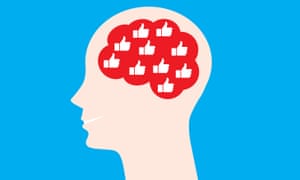Silicon Valley is keel to exploit the brain chemical credited with keeping us tapping on apps and social media

The capacity for ‘persuasive technology’ to influence behaviour is only just becoming understood. Illustration: James Melaugh for the Observer
In an unprecedented attack of candour, Sean Parker, the 38-year-old founding president of Facebook, recently admitted that the social network was founded not to unite us, but to distract us. “The thought process was: ‘How do we consume as much of your time and conscious attention as possible?’” he said at an event in Philadelphia in November. To achieve this goal, Facebook’s architects exploited a “vulnerability in human psychology”, explained Parker, who resigned from the company in 2005. Whenever someone likes or comments on a post or photograph, he said, “we… give you a little dopamine hit”. Facebook is an empire of empires, then, built upon a molecule.
Dopamine, discovered in 1957, is one of 20 or so major neurotransmitters, a fleet of chemicals that, like bicycle couriers weaving through traffic, carry urgent messages between neurons, nerves and other cells in the body. These neurotransmitters ensure our hearts keep beating, our lungs keep breathing and, in dopamine’s case, that we know to get a glass of water when we feel thirsty, or attempt to procreate so that our genes may survive our death.
In the 1950s, dopamine was thought to be largely associated with physical movement after a study showed that Parkinsonism (a group of neurological disorders whose symptoms include tremors, slow movement and stiffness) was caused by dopamine deficiency. In the 1980s, that assumption changed following a series of experiments on rats by Wolfram Schultz, now a professor of neuroscience at Cambridge University, which showed that, inside the midbrain, dopamine relates to the reward we receive for an action. Dopamine, it seemed, was to do with desire, ambition, addiction and sex drive.
Continue reading
No comments:
Post a Comment